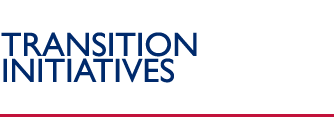USAID/OTI Afghanistan Hot Topics April 2004
Program Description
The goal of the U.S. Agency for International Development’s Office of Transition Initiatives (USAID/OTI) in Afghanistan is to increase citizen awareness of and confidence in the process of recovery, rehabilitation and democratic political development. Working with central and provincial governments, national and international NGOs, informal community groups, and media outlets, OTI identifies and supports critical initiatives that facilitate implementation of the Bonn Agreement, which was designed to move the country further along the continuum from war to peace. Projects are funded in 31 provinces of the country. To date more than 530 grants and sub-grants have been cleared for implementation. USAID/OTI’s implementing partners are the International Organization for Migration-Afghanistan Transition Initiative (IOM-ATI) and Internews.
USAID Support Brings Power to Rural Homes and Improves Livelihoods
This is the first time I have electricity in my house,” was the comment of one of dozens of villagers gathered around a newly installed micro-hydro power facility in the Shomali plains of central Afghanistan. “It’s great to be able to listen to the radio. I can find out what is happening in the country.”
 |
| A volunteer watches over a community-owned generator. |
USAID/OTI’s investments in small micro-hydro power systems in Afghanistan total just over $300,000. Relatively inexpensive, 54 new systems are bringing power to about 14,000 people in remote villages in eight of Afghanistan’s 32 provinces. The micro-power facilities are contributing to improved livelihoods and increased access to information for people in central and north-eastern Afghanistan.
Near Kabul, the capital of Afghanistan, more than 20 traditional watermills have been converted into micro-hydro power systems and are providing safe, clean and sustainable electricity to villages. In the Shomali plains, an important agricultural belt, citizens contributed unskilled labor to build five micro-hydropower plants. They also raised funds to purchase electrical cables and wires, bringing electricity to 300 families. Their houses are now brightly lit at night, and families are now able to pump water for household and agricultural uses, as well as spend evenings listening to the radio or watching television.
 |
| IOM-ATI engineers and community representatives examine an intake canal. |
Encouraged with the concrete results of their contributions to making the micro-power systems operational, community members have volunteered to manage the control rooms, turbines and generators that make the systems function. Communities also maintain the intake canals that feed the systems. Development of the micro-power systems is also contributing to the economy; more than 70 percent of equipment used for the construction is from Afghanistan.
USAID has funded several workshops undertaken by IOM-ATI on hydro-electricity during project implementation, drawing a great number of participants interested in harnessing renewable energy sources for productive purposes.
Private Independent Radio Succeeding in Afghanistan’s Conservative West
In just six weeks of operation Radio Nedaye Sulh has become one of the stars of the USAID/OTI-supported private, independent community radio network. The station, located in the desert halfway between the western Afghan city of Herat and the Iranian border, broadcasts radio programming ten hours a day.
 |
| Young journalists standing next to a letter box for community input to radio programming. |
A few months ago, the station comprised only a small local television station, cobbled together with $7,000 of local funding, with the capacity to broadcast just three hours a night. The station operated with a borrowed VHS camcorder, some commercial video cassette recorders, a satellite dish, and a rebuilt transmitter. The station created local programming, and rebroadcast programs from Afghan state television and Persian material from Iran.
Internews, specialists in media development in post-conflict societies, was contracted by USAID/OTI to facilitate the establishment of an independent network of FM radio stations. Internews provided the equipment support, training and business model to assist Radio Nedaye Sulh’s emergence and to expand its television broadcast capacity.
 |
| The station in the center of Ghoreyan, Herat. |
Three young women, unpaid volunteer high school students interested in journalism, serve as reporters with the station. They travel up to six hours by car to the provincial capital of Herat to gather information on issues affecting their communities.
Community members, from district government representatives to vegetable sellers, consider the station theirs. “We can get radio and television from Iran, but we would rather listen to our station,” was the response to inquiries about station preference. Locally produced programming has a community focus and letterboxes around town allow listeners to give the station feedback.
One of the challenges facing Radio Nedaye Sulh and the other fourteen stations established with support from USAID/OTI and Internews is increasing revenues and improving business plans. Toward this end, Internews is providing training in revenue development and community investment. The station in Ghoreyan is a leader in both of these areas, boding well for the future development of independent broadcasting in the Herat Province.
For further information, please contact:
In Washington: Elizabeth Callender, USAID/OTI/ANE Program Manager, Tel: 202-712-4078, ecallender@usaid.gov
|


